| # NAME | Calories per 100g | Protein per 100g | Total Fat per 100g |
|---|---|---|---|
| 132 cal | 17g | 5.7g | |
|
2
|
158 cal | 10.4g | 11.8g |
|
3
|
270 cal | 16.6g | 22.3g |
| 298 cal | 22g | 22g | |
|
5
|
356 cal | 25g | 27g |
| 374 cal | 32g | 27g | |
| 378 cal | 30.9g | 32.4g | |
| 393 cal | 27g | 31g | |
| 403 cal | 24.6g | 33.5g |
If you’re watching your waistline, you may tend to pass on the cheese platter.
But eating cheese can actually be part of your weight management/weight loss efforts and enhance your health (if you choose the right ones).
Here are the best low calorie cheese options in Australia – this one’s for you dairy lovers! 🐄
- Healthiest options – fetta or ricotta
- Lower salt options – swiss, cottage, ricotta
- Higher protein – cottage, blue, swiss, goat
10 Yummy Low Calorie Cheeses 🧀
Cottage Cheese

Calories per 100g: 132 cal
Protein per 100g: 17g
Carbohydrates per 100g: 1.8g
Total Fat per 100g: 5.7g
Sodium per 100g: 277mg
If you’ve tried a weight loss or bodybuilding diet, you’ve probably eaten a meal or snack using cottage cheese. That’s because cottage cheese is the lowest-calorie cheese around and it’s high in protein.
It also contains a great source of nutrients including calcium, B vitamins, phosphorus and selenium.
However, not all cottage cheese is the same nutritionally. Some will have added sugar, salt, preservatives and thickeners. Some cottage cheese will also be predominately made of skim milk, whereas others will be full-cream milk-based.
Cottage cheese can be high in sodium which needs to be considered if you are eating it regularly. It pays to check the ingredients and nutrition information to compare products and find an option best for you.
Ricotta
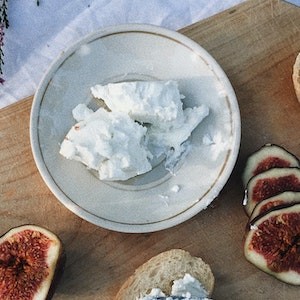
Calories: 158 cal
Protein : 10.4g
Carboydrates: 2.7g
Total Fat: 11.8g
Sodium : 170mg
Ricotta is one of the lowest-calorie cheeses at approximately 158 calories per 100g (depending on the brand). It’s typically made from cow’s milk whey, and some curd, so a good source of protein. Ricotta can also be made from sheep or goat’s milk.
Ricotta has a low glycemic index, rich in calcium and essential fatty acids, as well as antioxidants such as selenium.
Ricotta can be used sweet or savoury. Throw it in an omelette or scrambled eggs. Make a creamy dip to serve with veggie sticks or add a dollop onto toast. For a sweet dessert, serve ricotta with roasted peaches. Or mix it with some fresh berries finished with nuts and seeds.
Fetta
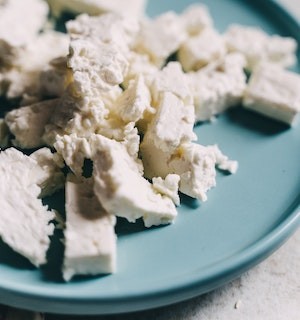
Calories: 270 cal
Protein : 16.6g
Carboydrates: 0.4g
Total Fat: 22.3g
Sodium : 1100mg
Fetta is another soft, creamy cheese that is lower in calories. Fetta is typically made from sheep and goat’s milk which can be an option for those who can’t digest cow’s milk (it does, however, contain lactose).
Fetta is considered a low-fat cheese but is a good source of fatty acids that may be beneficial in heart health and weight loss. It’s no wonder, fetta cheese is featured regularly in the Meditteranean diet.
As salt is used when making fetta, some brands are high in sodium. Again, you must read the nutrition labels and ingredients to determine whether fetta is suitable for you.
Mozzarella
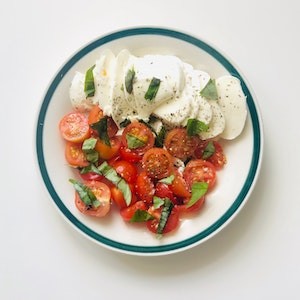
Calories: 298 cal
Protein : 22g
Carboydrates: 0g
Total Fat: 22g
Sodium : 522mg
Mozzarella offers a similar nutrient profile to the above soft cheeses – low in calories, containing protein, fat, B vitamins, calcium, phosphorus and selenium. It also contains sodium but is lower than many other cheese varieties.
Mozzarella is available whole or shredded. I always recommend opting for the whole form as the shredded varieties will contain preservatives and anti-caking agents to avoid the cheese pieces sticking and clumping together.
This cheese can be part of a healthy diet. It’s what you do with the mozzarella that has a bigger impact.
Gouda
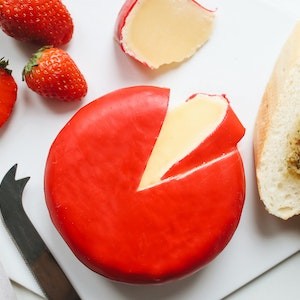
Calories: 356 cal
Protein : 25g
Carbohydrates: 2.2g
Total Fat: 27g
Sodium : 819mg
Made of cow’s milk, gouda is an aged cheese that varies in texture and flavour.
As with other cheeses, gouda contains a good source of calcium and protein. It also has a significant amount of dietary fats, vitamin B12, B5, B6, zinc and sodium.
Similarly, the nutrient content and ingredients will vary from brand to brand with some containing preservatives and colours. I generally suggest people steer clear of those cheeses that have been prepared in easy to eat forms like sliced or shredded. However, in this case, you can find some that don’t contain nasties like Woolworths Gouda Cheese Slices.
One thing to consider is it’s pretty easy to consume more than one serving of gouda and a large number of calories. If watching your calorie intake is important, measure out your portion before eating and put the rest of the block away out of reach!
Parmesan cheese
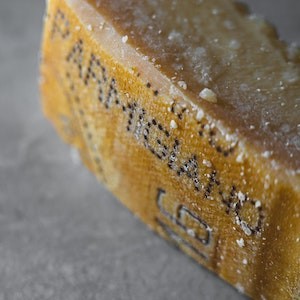
Calories per 100g: 374 cal
Protein per 100g: 32g
Carbohydrates per 100g: 0g
Total Fat per 100g: 27g
Sodium per 100g: 1000g
Parmesan cheese, also known as Parmigiano Reggiano, packs a punch in flavour and nutrition.
Yes, it is higher in calories than many other kinds of cheese due to its high fat and protein content, but it has other benefits.
The fat itself is made up of medium and short-chain fatty acids which are easily absorbed by the body and used for energy. Parmesan cheese is also often used in small portions such as fine shavings on a salad or a sprinkle on top of pasta.
Most people find parmesan cheese easily digested as it’s lactose-free and considered safe for those with lactose intolerance. Say goodbye to bloating, gas and alternating bowel movements.
Blue cheese
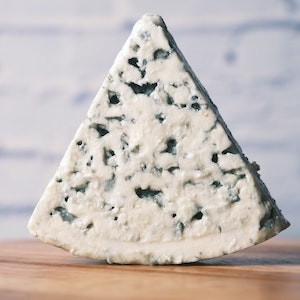
Calories: 378 cal
Protein : 30.9g
Carbohydrates: 0g
Total Fat: 32.4g
Sodium : 1090mg
Blue cheese is arguably one of the most divisive options on the cheeseboard. In addition to its mould cultures, its overpowering smell and bold taste can put people off immediately.
In terms of nutrients, blue cheese sits in towards the higher end of our 10 lowest-calorie cheese list. It’s also particularly high in calcium and dietary fats as well as the nutrients phosphorous, vitamin A and zinc. Blue cheese is one of the higher options in sodium.
You can find a variety of blue cheeses available such as Roquefort, gorgonzola or danish blue. It’s also available in reduce-fat. The nutritional content of blue cheese will change depending on the option you select.
The good news is that many of the brands contain minimal ingredients with no preservatives and thickeners.
Swiss cheese
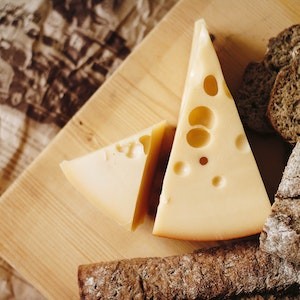
Calories per 100g: 393 cal
Protein per 100g: 27g
Carbohydrates per 100g: 1.4g
Total Fat per 100g: 31g
Sodium per 100g: 185mg
A classic cartoon cheese, Swiss cheese is a mild-tasting, low-calorie option made of cow’s milk. The holey form is actually caused by gas bubbles produced by the lactic bacteria.
As far as cheeses go, Swiss cheese is a great option in terms of ingredients with most containing minimal, natural ingredients. This is also the case with pre-sliced swiss cheese products.
Swiss cheese is also relatively low in sodium, but still high in protein which will keep you feeling fuller for longer.
Cheddar Cheese
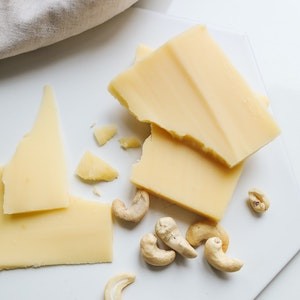
Calories per 100g: 403 cal
Protein per 100g: 24.6g
Carbohydrates per 100g: 0.3g
Total Fat per 100g: 33.5g
Sodium per 100g: 686mg
Cheddar cheese is a popular variety for its versatility and taste. But it is higher in calories than many kinds of cheese as well as fat and sodium.
The increase in calories and fat does make it more satisfying and it can work well for those on a low-carbohydrate or ketogenic diet. As a hard, aged cheese, cheddar can be easier for people to digest due to its lower lactose content.
Cheddar cheese does vary in quality. Steer clear of shredded or sliced cheddar due to the preservatives and anti-caking agents. I also recommend you put back the string cheese sticks and definitely pass on the singles due to the large number of artificial ingredients used.
Is Cheese Healthy? 🍎
Cheese is low in carbs and packed with protein and essential fats, plus it’s rich in calcium and nutrients like B vitamins and zinc. It can even help with cholesterol and blood pressure. But, not everyone can stomach dairy – it can wreak havoc on some people’s digestive systems!
The health factor of cheese also depends on the quality. Traditional, minimally processed cheeses are healthier than those loaded with additives.
Whether cheese is healthy for you is also down to what you pair the cheese with and how much you’re eating (it’s hard to stop once you start!)
Can I Eat Cheese While Trying to Lose Weight? 😋
Yes, you can eat cheese while trying to lose weight. The key is moderation. Cheese is calorie-dense, so small portions are essential.
Opt for cheeses that are high in protein and calcium but lower in fat, like cottage cheese or feta. These can add flavour and texture to your meals without too many extra calories.
Is Cheese Keto Friendly? 👀
Cheese is often a staple in the keto diet because it’s high in fat and protein but low in carbs. Most cheeses are keto-friendly, particularly high-fat cheeses like cheddar, mozzarella, brie, gouda, and cream cheese. Just check the labels for carb content to stay within your daily limits.
Low Calorie Mac & Cheese Recipe 🍽️
Ingredients
- 340g fusilli or elbow pasta
- 1 1/2 tbsp butter spread
- 1/4 cup minced onion
- 1/4 cup flour
- 2 cups milk (your choice)
- 1 cup vegetable broth
- 2 cups shredded cheddar or vegan cheddar
- 12 oz fresh broccoli florets
- 2 tbsp grated Parmesan or nutritional yeast
- 1/4 cup seasoned bread crumbs
- Cooking spray
- Salt and pepper to taste
Recipe
- Cook pasta as per instructions; drain.
- Sauté 1/4 cup minced onion in 1 1/2 tbsp butter spread.
- Stir in 1/4 cup flour, then gradually add 2 cups milk and 1 cup vegetable broth.
- Add 2 cups shredded cheddar, stirring until melted.
- Mix in cooked pasta and 12 oz broccoli florets.
- Pour into a baking dish coated with cooking spray.
- Top with 2 tbsp Parmesan or nutritional yeast and 1/4 cup bread crumbs.
- Bake until bubbly.
Source: Chocolate Covered Katie
Don’t like cooking? Try these pre-cooked meals from two of our favourite providers!
- A Life Plus: Keto Bacon Cauliflower Mac and Cheese
- My Muscle Chef: Loaded Mac & Cheese with Beef Rashers
- Watch your portions
- Pair cheeses with foods naturally low in sodium
- Avoid fat-free or flavoured options due to the extreme processing
- Steer clear of the rich, creamy cheeses like brie and camembert
Low Calorie Cheese FAQs
What is the healthiest cheese for weight loss?
What is low calorie lactose free cheese?
Low calorie lactose-free cheese options include some hard cheeses like Cheddar, Swiss, and Parmesan. These cheeses aren’t 100% lactose free but they do have a lot less lactose due to the way they’re processed.
What cheese has the most calories?
Cream cheese, brie and certain types of blue cheese are typically high in calories due to their fat content.
What’s the best high protein cheese?
Parmesan, Romano, and Swiss cheese are among the highest in protein, which can be beneficial for those looking to increase their protein intake.
Dairy isn’t for everyone but quality cheeses can be part of a well-balanced diet if your body can digest them. Due to the natural protein and fat content, there is no such thing as a “low calorie” cheese but there are options that can fit into your calorie requirements.
The key is choosing a quality product that’s minimally processed. Watch the sodium content and those added ingredients like preservatives, flavours, anti-caking agents and colours.
Above all, consider what you’re serving your cheese with and how much you’re consuming. This is really what is going to push your calorie intake for the day over the edge.














Thanks there are too many tempting cheeses out there atleast eating on occasions and small amounts should be fine?is it bad for your cholesterol?